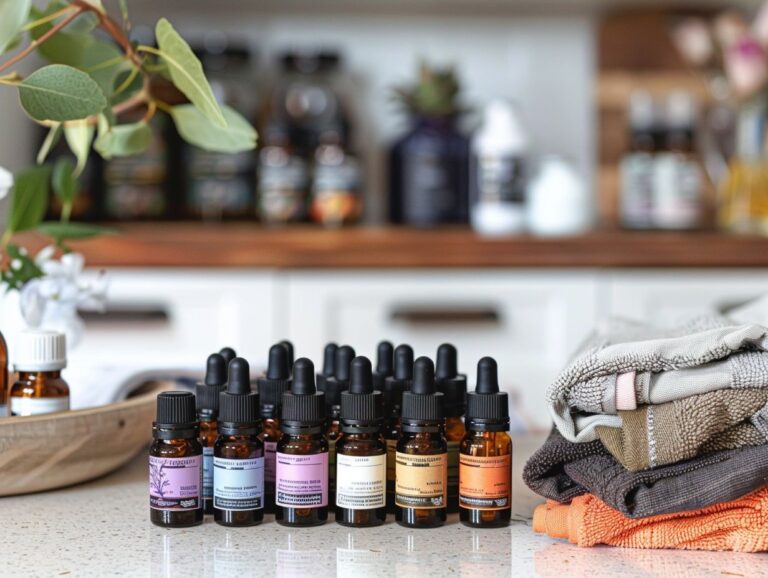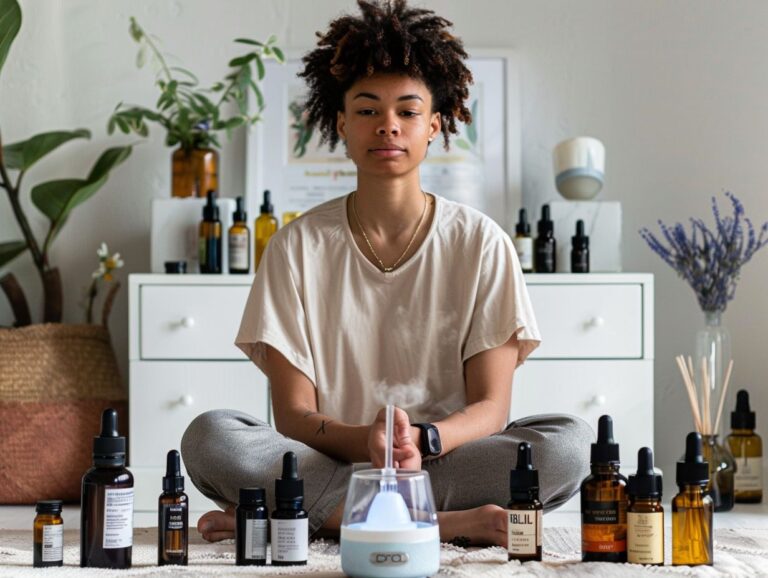Can Essential Oils Make You Hallucinate
Have you ever wondered about the world of essential oils and their potential benefits? From aromatherapy to stress relief, essential oils have gained popularity for their various uses. But can essential oils cause hallucinations?
In this article, we will explore the different types of essential oils, their benefits, and the potential side effects, including hallucinations. We will also discuss how to prevent and manage any adverse reactions. So, let’s dive in and discover the fascinating world of essential oils!
Key Takeaways:
What Are Essential Oils?
Essential oils are concentrated liquids extracted from plants, known for their aromatic properties and various potential health benefits. These oils are highly potent and should be used with caution due to their natural composition and potential risks associated with improper use.
The extraction process of essential oils involves carefully collecting the volatile compounds from the plant material through methods like steam distillation, cold pressing, or solvent extraction. Due to the high concentration levels of these oils, it is crucial to dilute them properly before direct skin application or ingestion to avoid adverse reactions.
The FDA closely regulates the safety and labeling of essential oils to ensure consumers are informed about their proper usage. It is essential for users to follow the recommended guidelines and consult with a healthcare professional before incorporating these oils into their routine.
How Are Essential Oils Used?
Essential oils can be used in various ways, including aromatherapy, topical application, and sometimes ingestion. It is crucial to follow proper dilution guidelines and safety precautions when using essential oils to avoid adverse reactions.
When using essential oils for aromatherapy, diffusing them using a diffuser can help disperse the aroma throughout a room, creating a calming or energizing atmosphere.
For topical application, it is essential to dilute essential oils with a carrier oil, such as coconut or jojoba oil, to prevent skin irritation.
Before applying a new essential oil to your skin, conducting a patch test on a small area can help determine if you have any sensitivities or allergies to that specific oil.
As for ingesting essential oils, it is highly recommended to seek guidance from a qualified healthcare practitioner due to the potential risks involved.
What Are the Different Types of Essential Oils?
There is a wide variety of essential oils available, each derived from different plants and possessing unique properties. Some popular types include lavender, tea tree, mint, and eucalyptus oils.
For instance,
- lavender oil is renowned for its calming and relaxing effects, often used in aromatherapy to promote sleep and reduce anxiety.
- On the other hand, tea tree oil is prized for its antibacterial and antifungal properties, making it a go-to choice for skincare remedies.
- Additionally, mint oil is known for its invigorating scent, perfect for boosting energy and alleviating headaches.
- Similarly, eucalyptus oil is commonly used to relieve respiratory congestion.
It’s crucial to dilute essential oils properly before application and conduct a patch test to avoid potential skin irritations.
What Are the Benefits of Essential Oils?
Essential oils offer a range of potential benefits, from promoting relaxation and stress relief to aiding in pain management and improving sleep quality. Some oils also have medicinal uses, but caution must be exercised due to the risk of adverse reactions or even seizures in some cases.
One essential aspect to keep in mind when using essential oils is their varying strengths and compositions that can impact their effectiveness and safety. For example, lavender oil is renowned for its calming properties, ideal for alleviating anxiety and promoting better sleep, whereas peppermint oil is commonly employed for its analgesic abilities in managing headaches and muscle pain.
Aromatherapy
Aromatherapy is a popular practice that involves using essential oils to promote relaxation, improve mood, and alleviate certain health conditions. When using essential oils for aromatherapy, it is essential to dilute them properly and prioritize safety to prevent adverse reactions.
One of the key principles of aromatherapy is understanding how different essential oils interact with the body and mind. Each oil has unique properties that can impact emotions and well-being.
To ensure the safe and effective use of essential oils in aromatherapy practices, it’s crucial to conduct a patch test before applying any new oil on the skin. Always follow recommended dilution ratios and consult a qualified aromatherapist for guidance.
Stress Relief

Essential oils are often used for stress relief due to their calming and anxiety-reducing properties. It is important to be mindful of potential skin irritation and ensure overall health safety when using these oils for stress management.
Some specific essential oils have gained popularity for their stress-reducing effects, including lavender, chamomile, and bergamot. Lavender is well-known for its soothing properties, chamomile for its relaxing scent, and bergamot for its mood-boosting qualities. Before applying any essential oil topically, it is essential to perform a skin patch test to check for any adverse reactions. Individuals with sensitive skin or underlying health conditions should consult healthcare professionals to ensure safe usage.
Pain Relief
Certain essential oils have analgesic properties that make them effective for pain relief, whether from headaches, muscle soreness, or other discomforts. It is essential to choose high-quality products approved by the FDA when using essential oils for pain management.
When turning to essential oils for pain relief, consider popular options like peppermint, lavender, and eucalyptus, known for their soothing properties. These oils can be used in various ways, including topical application, aromatherapy, or diluted for massage. Remember, not all essential oils are created equal, so it’s crucial to research reputable brands and ensure they meet FDA standards for purity and safety.
- Always perform a patch test before widespread use to check for any adverse reactions.
- Consult a healthcare professional, especially if you have underlying medical conditions or are pregnant.
- Follow dosage recommendations and dilution guidelines to prevent skin irritation or sensitivities.
Improved Sleep
Essential oils can be beneficial in promoting improved sleep quality and combating insomnia through their calming and sedative effects. It is crucial to consider potential side effects and research-backed recommendations when using essential oils for sleep enhancement.
Research suggests that certain essential oils like lavender, chamomile, and valerian root can help relax the mind and body, leading to better sleep. These oils are believed to have therapeutic properties that induce a sense of calmness and tranquility, making them ideal for creating a soothing bedtime routine. It is recommended to dilute essential oils with a carrier oil before applying them topically or using a diffuser for aromatherapy. Ensuring good ventilation in the room during oil diffusion is essential to prevent any adverse reactions.
Can Essential Oils Cause Hallucinations?
While essential oils are generally safe when used correctly, misuse or sensitivity to certain oils can lead to adverse effects, including hallucinations. It is crucial to be aware of the risks associated with improper use of essential oils to prevent such reactions.
Some essential oils, like Sage, Nutmeg, and Thyme, contain compounds that can affect the central nervous system, potentially causing hallucinatory experiences if used in excessive amounts. For instance, excessive inhalation of Clary Sage oil or applying undiluted Nutmeg oil on the skin can have profound effects on perception and cognition, leading to hallucinations.
Proper dosages and dilution ratios are vital to avoid adverse reactions. Consulting a qualified aromatherapist or healthcare professional before using essential oils can help determine safe practices tailored to individual needs and minimize potential risks of experiencing hallucinations.
Misuse of Essential Oils
Misuse of essential oils, such as ingesting undiluted oils or using them inappropriately, can pose serious health risks due to their toxic and potentially hazardous nature. It is essential to adhere to proper guidelines for the safe use of essential oils to avoid toxicity.
One common mistake is ingesting essential oils orally without proper dilution, which can lead to irritation, burns, or even damage to internal organs. Applying concentrated oils directly to the skin without dilution can cause severe skin reactions, including burns and rashes.
- It is crucial to dilute essential oils with carrier oils like coconut or almond oil before applying them topically.
Always perform a patch test before widespread application to check for any adverse reactions.
Furthermore, diffusing essential oils in well-ventilated areas is recommended to prevent respiratory issues that can arise from prolonged inhalation. Remember that essential oils are potent substances and should be treated with caution and respect to enjoy their benefits safely.
Sensitivity to Certain Oils
Individuals may exhibit sensitivity or allergic reactions to specific essential oils, leading to symptoms of toxicity such as skin irritation, respiratory issues, or nausea. Understanding potential sensitivities and reactions is crucial when using essential oils.
It is vital to be aware of the common signs of sensitivity, which can include redness, itching, or a rash when essential oils come into contact with the skin. Respiratory effects like coughing, sneezing, or difficulty breathing may signal a negative reaction to the oils.
Conducting a patch test on a small area of skin before using the oil extensively is a proactive measure to prevent adverse reactions. Any signs of dizziness, headache, or nausea after exposure should not be ignored, as they could indicate a more serious toxicity issue.
What Are the Symptoms of Essential Oil Hallucinations?

Confusion can range from feeling disoriented to complete disconnection from reality, impacting one’s ability to think clearly. Altered perception may involve distorted sensory experiences, where the affected individual may feel sensations that are not actually there. Visual disturbances can present as seeing colors or shapes that are not real, often accompanied by a sense of unreality.
- Seizures are serious manifestations that require immediate medical attention. In case of hallucinations induced by essential oils, if an individual experiences seizures, loss of consciousness, or severe disorientation, it is crucial to seek medical help without delay.
How Can You Prevent Essential Oil Hallucinations?
Preventing essential oil-induced hallucinations involves diluting oils properly, avoiding high-risk oils known for their hallucinogenic effects, and storing them safely away from children and pets. It is essential to follow proper safety precautions to minimize the risk of adverse reactions.
Regarding diluting essential oils, a general rule of thumb is to mix them with a carrier oil such as coconut or jojoba oil. This helps reduce the potency of the essential oil, making it safer for use. Proper dilution ratios are crucial to prevent skin irritation or other adverse effects. Certain oils to be cautious of include wormwood, pennyroyal, and camphor due to their potent properties that can lead to hallucinations. Always ensure that essential oil bottles are securely sealed and stored in a cool, dark place, out of reach of curious hands.
What Should You Do If You Experience Hallucinations from Essential Oils?
If you experience hallucinations or adverse effects from essential oils, it is essential to immediately discontinue use, ventilate the area, and seek fresh air. Avoid topical application of oils, especially in sensitive areas, and ensure pets are kept away from the source of exposure.
Next, it’s crucial to wash any oil residue off your skin with soap and water, and if oil has been ingested, drink plenty of water to dilute it.
If symptoms persist or worsen, do not hesitate to seek medical attention promptly. It is essential to inform healthcare professionals about the essential oil used and the symptoms experienced for proper evaluation and treatment. Remember, safety should always come first when dealing with any potentially harmful substance, and immediate action can prevent further complications.
Are There Any Other Side Effects of Essential Oils?
Along with hallucinations, essential oils can cause other side effects such as skin irritation, allergic reactions, and respiratory issues in some individuals. Practicing caution and understanding the potential risks associated with essential oils is essential for safe usage.
When essential oils come into direct contact with the skin, they may lead to irritation, redness, or even burns, especially when used undiluted or in high concentrations. Allergic reactions, ranging from mild itching to severe hives and swelling, can occur in sensitive individuals.
Inhaling essential oils can trigger respiratory discomfort, such as coughing, wheezing, or shortness of breath, particularly in those with underlying respiratory conditions like asthma. It’s crucial to dilute oils properly and use them in well-ventilated areas to minimize these risks.
To avoid skin sensitivities and allergic responses, perform a patch test before widespread application of any new essential oil. Always adhere to recommended dilution ratios and consult with a healthcare professional, especially if you have existing medical conditions or are pregnant.
Skin Irritation
Skin irritation is a common side effect of essential oils, particularly when used undiluted or applied to sensitive skin. It is essential to prioritize skin health and well-being when using essential oils to prevent adverse reactions and maintain overall skin integrity.
One significant factor contributing to skin irritation from essential oils is their highly concentrated nature, which can overwhelm the skin’s natural protective barriers. Without proper dilution, essential oils can cause redness, itching, or even chemical burns on the skin due to their potent properties.
Individuals with sensitive skin or preexisting skin conditions are more susceptible to adverse reactions from essential oils. Dilution is crucial, as it helps reduce the risk of irritation and allergic responses by lowering the concentration of the oil.
Another vital precaution is patch testing, where a small amount of diluted essential oil is applied to a small area of skin to check for any negative reactions before full application. This simple step can help identify potential irritants and prevent widespread skin discomfort.
The U.S. Food and Drug Administration (FDA) provides guidelines on safe essential oil practices, recommending proper dilution ratios and patch testing to minimize the risk of skin-related issues. Following these guidelines is essential for ensuring the safe and effective use of essential oils without compromising skin health.
Allergic Reactions
Some individuals may experience allergic reactions to certain essential oils, leading to symptoms like skin redness, itching, or hives. These reactions can range from mild to severe, requiring prompt medical attention in case of severe symptoms or seizures.
Allergic reactions to essential oils can manifest in various ways, such as respiratory issues, swelling of the face, tongue, or throat, and even anaphylaxis, a severe and potentially life-threatening reaction. It is crucial to identify these early signs and respond promptly. If experiencing symptoms like difficulty breathing, rapid heartbeat, or dizziness after exposure to essential oils, it is essential to seek immediate medical help. Some individuals may require prescribed medications like antihistamines or corticosteroids to manage allergic responses effectively. Consulting healthcare professionals for proper evaluation and guidance is recommended to prevent future allergic reactions and ensure appropriate treatment.
Respiratory Issues

When essential oils are inhaled, the aromatic compounds can directly affect the respiratory system, especially in those prone to sensitivities. The potent nature of these oils may irritate the airways and exacerbate existing respiratory conditions, such as asthma or allergies.
It is recommended to dilute essential oils before inhalation and use them in well-ventilated areas to minimize the concentration of airborne particles. Additionally, avoid prolonged exposure to essential oil vapors, as this can overload the respiratory system and potentially lead to irritation or inflammation.
Frequently Asked Questions
Can Essential Oils Make You Hallucinate?
Yes, some essential oils have mind-altering properties that can potentially cause hallucinations.
Which essential oils can cause hallucinations?
The most commonly reported essential oils for causing hallucinations are rosemary, sage, and nutmeg.
What is the mechanism behind essential oils causing hallucinations?
Essential oils contain compounds that can interact with the brain’s receptors, altering neurotransmitter levels and potentially causing hallucinations.
Can inhaling essential oils lead to hallucinations?
Yes, inhaling essential oils can cause direct effects on the brain, which can lead to hallucinations.
Are there any safety precautions when using essential oils to avoid hallucinations?
Yes, it is important to always dilute essential oils properly and use them in a well-ventilated area to avoid inhaling too much at once. It is also recommended to avoid using large amounts of oils known to have mind-altering effects.
Are there any reported cases of hallucinations caused by essential oils?
Yes, there have been cases of individuals experiencing hallucinations after using essential oils, particularly during aromatherapy sessions. It is important to be aware of the potential risks and use essential oils with caution.







